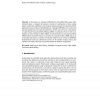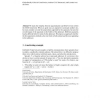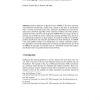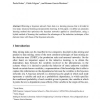IFIP12
2008
13 years 6 months ago
2008
In this paper we: introduce EMADS, the Extendible Multi-Agent Data mining System, to support the dynamic creation of communities of data mining agents; explore the capabilities of ...
IFIP12
2008
13 years 6 months ago
2008
In this article we describe the joint effort of experts in linguistics, information extraction and risk assessment to integrate EventSpotter, an automatic event extraction engine, ...
IFIP12
2008
13 years 6 months ago
2008
: Hospital Acquired Infections (HAI) is a real burden for doctors and risk surveillance experts. The impact on patients' health and related healthcare cost is very significant...
IFIP12
2008
13 years 6 months ago
2008
We study the interplay between argumentation and belief revision within the MAS framework. When an agent uses an argument to persuade another one, he must consider not only the pro...
IFIP12
2008
13 years 6 months ago
2008
Top Down Induction of Decision Trees (TDIDT) is the most commonly used method of constructing a model from a dataset in the form of classification rules to classify previously unse...
IFIP12
2008
13 years 6 months ago
2008
The Repertory Grid method is widely used in knowledge engineering to infer functional relationships between constructs given by an expert. The method is ignoring information that c...
IFIP12
2008
13 years 6 months ago
2008
Obtaining a bayesian network from data is a learning process that is divided in two steps: structural learning and parametric learning. In this paper, we define an automatic learni...
IFIP12
2008
13 years 6 months ago
2008
Believability of computerised agents is a growing area of research. This paper is focused on one aspect of believability - believable movements of avatars in normative 3D Virtual W...
IFIP12
2008
13 years 6 months ago
2008
Sampling methods are a direct approach to tackle the problem of class imbalance. These methods sample a data set in order to alter the class distributions. Usually these methods ar...
IFIP12
2008
13 years 6 months ago
2008




